 Started October 20, 2022
Course
Started October 20, 2022
Course
 Ludwig-Maximilians University Munich (LMU), Insitution for Sociology | Konradstraße 6, 80801 Munich
Ludwig-Maximilians University Munich (LMU), Insitution for Sociology | Konradstraße 6, 80801 MunichRethinking War, the Military and Gender Through the Russian War on Ukraine
Mondays and Thursdays 17:30 – 19:00 (CET)
In English, Russian, Ukranian

This series is coordinated by Paula-Irene Villa Braslavsky (LMU Munich) and Andrea Peto, (CEU Vienna, CEU DI, Budapest).
The aim of the series is to give visibility and some space for threatened gender studies scholars who are working on the topic of war and violence. The starting point is to critically revisit the existing literature on war, violence, and gender based on the experience of the war of Russia against Ukraine.
Topics discussed include sexual violence during wartime, media images of women at war, women in the army and shifts in the everyday life, national/transnational feminism and the role of gender studies in fostering solidarity, the role of the museum and herstory of war in promoting and upholding women’s rights, homonationalism and LGBTQ activism during the war.
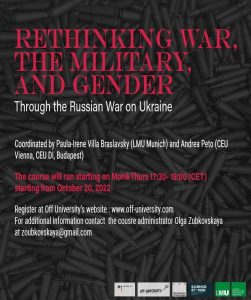
Learning Aims
To provide general understanding about:
- Feminism and feminist research in Ukraine
- State of the art in researching militarism, and war from a gender perspective
- Challenges of war and genocide studies
Upon the successful completion of the course students will be able to:
- understand some of the major changes in the way war and genocides have been mediated, narrated, and studied in past decades, developing a critical grasp of how wars and genocides are also gendered experiences
- demonstrate an understanding of how feminist critique contributes to war/genocide studies
- understand, through selected instances, how racism, economic exploitation, cultural or religious prejudice, gender, and genocide have been enacted in colonial contexts
- understand that implementing change depends upon engaging with histories of autocracy, racism, illiberalism, and attempts to undermine democracy
Course Outline
The preliminary syllabus can be found here. The final version will be updated soon.
Please note that there will be a preparatory meeting that will take place during the usual class hours one week before the class starts. In this meeting, we will introduce you how the platform works and we will offer technical support so that everybody is technically ready for the first session.
Meet your instructor
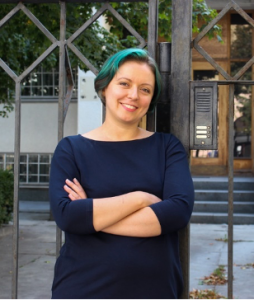
Oksana Potapova, Kyiv, Ukraine (temporarily based in Berlin/London since March 2022) women’s rights and peace activist, practitioner of critical pedagogy and theatre of the oppressed, feminist researcher and advocate of feminist peace. Born and raised in the east of Ukraine, Oksana has been involved in addressing the aftermath of the conflict in Donbas since 2014. In 2015 Oksana co-founded «Theatre for Dialogue» NGO and women’s initiative “One of Us” where she was using community theatre and feminist pedagogy to build dialogue and cohesion, and to advocate the rights of internally displaced and other marginalized groups of women at the national and international level. This experience led to her interest in embodied feminist methodologies, and to advocacy of the intersectional WPS agenda. Oksana combines activism with research and advocacy for feminist peace and grassroots movement building in Ukraine. In September 2021 she completed with distinction a Master’s program in Gender, Peace, and Security at the London School of Economics. Her master’s thesis focused on embodied arts-based practices as decolonial methodologies for knowledge production about peace and security. In September 2022 she started her Ph.D. program with the Department of Gender Studies at the London School of Economics and Political Sciences.
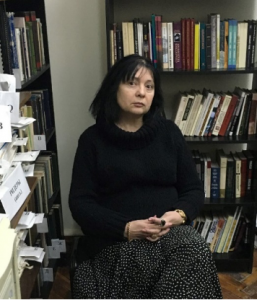
Irina Zherebkina is a professor of Theory of Culture and Philosophy of Science at V. N. Karazin Kharkiv National University, and the permanent director of the Kharkiv Center for Gender Studies (KhCGS), which she helped found in 1994. Irina has been the editor-in-chief of the influential periodical Gender Studies Journal since 1998 and was a member of the Journal of the National Women’s Studies Association (NWSA) Journal between 2006 and 2008. She organized several International Summer Institutes on Gender Studies in Faros which served as a place to exchange ideas and train several generations of scholars in Gender Studies. In the late 1990s and early 2000s she was a guest lecturer at several American universities, including Iowa State University (USA) and York State University (Canada). She is the author of several books on Philosophy and Gender Studies, including. Contemporary Western Philosophy. Introduction (in Russian); Cyborg-Nationalism, or Ukrainian Nationalism in the Era of Post-nationalism.; World and Peace by Judith Butler. (in Russian): She is the editor of the influential Introduction to Gender Studies handbook widely used to train young scholars in Russia and Eastern Europe. Her research interests include philosophy, cultural theory, and gender studies.
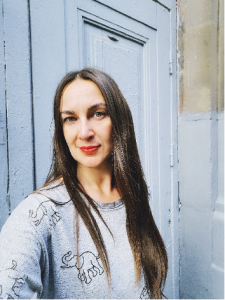
Tamara Zlobina graduated from National Institute for Strategic Studies, Kyiv in 2010. She holds a PhD (kandydat nauk) degree in Philosophy, with specialisation in Humanitarian and Political Security of the State. Her expertise lies in gender studies, feminist research and activism, gender mainstreaming for businesses and NGOs, feminist attitudes towards society and culture, transformational processes in Eastern Europe, and media management. Since 2016 Tamara has been an Editor in Chief of Gender in detail expert resource (https://genderindetail.org.ua/), that is the major Ukrainian media about gender equality. Tamara works as a public intellectual and publishes numerous articles on gender equality in national media. Her recent academic writings were published in New Imaginaries. Youthful Reinvention of Ukraine’s Cultural Paradigm. Edited and Translated by Marian J. Rubchak. Berghahn Books: Oxford, New York, 2015 (Chapters: Theory to practice: the personal becomes political in the post-soviet space and Masquerading as womanliness: female subjectivity in Ukrainian contemporary art). She is also an author of concepts “gender decay” and “gender eclecticism” that describe the current gender regime in Ukraine. Tamara explains these concepts in her numerous public lectures in Ukraine and abroad.
.png)
Yuliia Siedaia, sociologist, research fellowship, KAS scholarship holder. Ph.Yuliia graduated from the depart Kharkiv National University by V. Karazin, specialty- applied sociology, Kharkiv National University by V. Karazin, speciality-English language and English literature Simon Kuznets Kharkiv National University of Economics, speciality -public administration. She was as an program Consultant NDI for International Affairs in Ukraine, Gender Policy and Non-Discrimination Advisor of governor of Kharkiv regional state administration, Human rights local expert at Council of Europe. Research experience: Sociology, political science, informational war, ethical and law issues, philosophy, psychology, social psychology, women studies, sociology of law, sociology of war. Yuliia has more than 150 publications and abstracts, including: Some aspects of the implementation of reproductive rights. In Materials of scientific papers and reports International scientific conference of young scientists and students. Kharkov: Human rights; Military conflict in Ukraine Through issues of gender-based violence in Materials of scientific papers and reports of V International scientific conference “Gender. Environment. Health., Kharkiv 2017; . Social media and their weaponization under conditions of informational warfare in Proceedings XXX Kharkiv Political readings, 2017 – Kharkiv: Pravo, 2017.
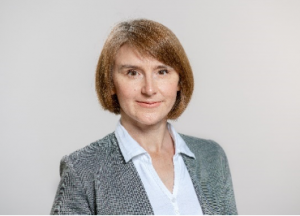
Olena Strelnyk obtained her Dr. Habilit. Degree in Sociology in 2018 at Taras Shevchenko Kyiv National University, Ukraine. She is the author of “Childcare as work. A sociological perspective on mothering” (2017). The fields of her expertise are gender issues, family, parenthood, and unpaid care work. She was a visiting scholar at the Institute for Research on Women and Gender, University of Michigan (in the frame of Carnegie Research Fellowship Program, 2016), and at Prague Civil Society Centre (2019). Her recent research and expert work in Ukraine focused on the situation of women from national minorities (OSCE, 2021), the impact of Covid-19 on the situation and needs of women (UN Women, 2020), preschool childcare system in the context of gender inequality in Ukraine (Rosa Luxemburg Stiftung, 2020). Since April 2022, Olena has been a Visiting Scholar within the program to support Ukrainian scholars at risk in the Technical University of Munich. Olena also continues to work remotely in Ukraine, she collaborates with the NGO Bureau of Gender Strategies and Budgeting; in a project related to humanitarian aid to women and the topic of gender-responsive approaches in the work of local governance.

Tetiana Isaieva is an activist with 20 years of experience in the area of cooperation between NGOs, national and international funds, and programs, including the Program of Equal Opportunities and Rights of Women in Ukraine EU-UNDP, Ukrainian Women’s Fond, Global Fund for Women, UN Women, Global Giving, Fredrik Ebert Foundation (FES), Germany, Sweden Women’s Public School, International Association of Women’s Museums. She has more than 14 years of experience in researching women’s and gender history for the development of the expositions and exhibitions at the Museum of Women’s and Gender History (32 off-line and online exhibitions), which include among others My Voice Means Something exhibition in the House of Austrian History (Austria, Vienna); online Anthology of women’s stories on www.gendermuseum.com in the framework of the HerStory of the War project; exhibition Birth Culture (Ukraine, Kharkiv, Gender Museum) in the framework of the international project Birth Culture. Tetiana coordinated various educational programs and projects and worked with local authorities to implement those. She has also served as a trainer on gender-related issues.
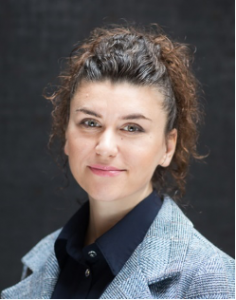
Marta Havryshko is a Research Associate at the Ukrainian Academy of Sciences of Ukraine and URIS Fellow at Basel University. Also, she is a Babyn Yar Interdisciplinary Studies Institute and a member of the International Research Group Sexual violence in Armed Conflicts. She published extensively on the gender dimensions of WWII and the Holocaust. Currently, she is developing her book project on sexual violence during the Holocaust in Ukraine.
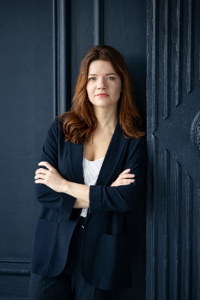
Maryna Shevtsova is a Marie Sklodowska-Curie EUTOPIA-SIF COFUND Fellow at University of Ljubljana, Slovenia and Senior FWO Fellow at KU Leuven, Belgium. She was a Swedish Institute Postdoctoral Fellow at the University of Lund (2020) and a Fulbright Scholar at the University of Florida, USA 2018/19. Her publications include books LGBTI Politics and Value Change in Ukraine and Turkey: Exporting Europe? (Routledge, 2021) and LGBTQ+ Activism in Central and Eastern Europe. Resistance, Representation, and Identity (with Radzhana Buyantueva, Palgrave Macmillan 2019). She is currently working on an edited volume on the ongoing War in Ukraine (2014-2022) bringing together diverse contributions by Ukrainian feminist scholars and activists.
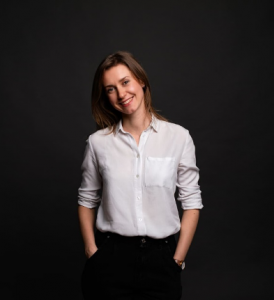
Anna Kvit is an independent researcher and women peace and security expert. She worked for international organizations and civil society organizations in Ukraine. Her experience covers empirical research on women in the military of Ukraine, veterans’ reintegration into civilian life, and gendered impacts of the war in Ukraine. Anna participated in the development of the programs and policies on the implementation of the Women, Peace, and Security agenda in Ukraine. She co-taught Military Sociology at the National University of Kyiv-Mohyla Academy. Anna holds a BA degree in Sociology from the National University of Kyiv-Mohyla Academy (Ukraine) and an MA degree in Global Political Economy from the University of Kassel (Germany).
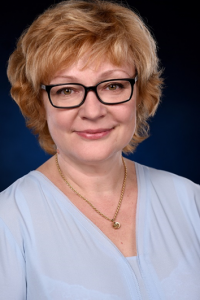
Gelinada Grinchenko is a Professor of History at the Department of Ukrainian Studies (Faculty of Philosophy, V. N. Karazin National University, Kharkiv, Ukraine) and Scholar at Risk at University of Wuppertal, Germany; Editor-in-Chief of the Ukrainian based academic peer-reviewed journal Ukraina Moderna; Head of the Ukrainian Oral History Association, Member of German-Ukrainian Historical Commission. Her main areas of interest are oral history, the history and memory of WWII, Holocaust and Genocide Studies, Memory Studies. She has edited several books and journals, and published many chapters and peer-reviewed articles on these issues. Her latest edited volumes are: Traitors, Collaborators, and Deserters in Contemporary European Politics of Memory: Formulas of Betrayal, ed. by G. Grinchenko and E. Narvselius (Palgrave Macmillan Memory Studies, 2018), 422 pp.; Listening, Hearing, Understanding: an Oral History of Ukraine in Twentieth and Twenty-First Centuries (in Ukrainian), ed. by Gelinada Grinchenko (ART-KNYHA, Kyiv, 2021), 352 pp.
This course is held at the Institution for Sociology, at the Ludwig-Maximilians-Universität München (LMU), and organized in cooperation with Off-University and Science at Risk – Akademisches Netzwerk Osteuropa (AKNO). It is financed by the German Foreign Office.